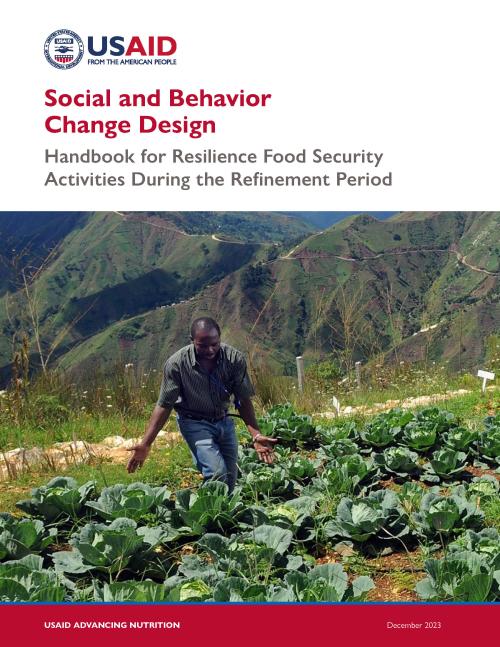Social and Behavior Change Design: Handbook for Resilience Food Security Activities During the Refinement Period
SBC is the lynchpin of achieving each purpose in the theory of change (TOC). The refine and implement (R&I) model, especially the refinement period, allows resilient food security activities (RFSAs) to review and test aspects of their TOC, complete necessary formative assessments, and pilot interventions so they can revise the TOC and project implementation plan based on these collective findings. Just as experiences and findings guide the TOC, they will also clarify pathways to social and behavior change and thus lead to modification in priority behaviors and the strategy for improving uptake and sustainability. The evidence-based, locally driven SBC strategy with relevant SBC capacity-strengthening activities should mirror and support the overall RFSA implementation plan.
The purpose of this handbook is to orient RFSA partners with step-by-step instructions for SBC best practices, providing practical tools for each milestone during the refinement period. Seven milestones are used to organize the best practice instructions and tools in (loosely defined) time periods in the refinement period. “Early refinement” lasts from award to the inception workshop. “Mid-refinement” is when partners conduct pilots, learning, and research studies. “Late refinement” is the time prior to the culmination workshop, and “later refinement” is between culmination and the Year 2 Pipeline and Resource Estimate Proposal. Although the milestones are presented within these time periods, SBC uses iterative processes with continual learning and refinement during R&I and throughout the life of the project. This embrace of iteration for all approaches, including SBC, is a RFSA hallmark.
The Bureau for Humanitarian Assistance (BHA) recognizes that many resources are available for RFSAs to design, implement, and measure quality SBC. This handbook pulls together existing resources that RFSA implementing partners can use during the refinement period, but is not prescriptive on any particular resource or approach. This handbook aims to assist in developing a clear roadmap for the end of the refinement period that includes—
• a manageable number of prioritized behaviors for each TOC purpose
• identified factors, or barriers and enablers, that prevent or support priority behaviors and that are informed by learning from relevant information gaps and formative research
• planned activities for each priority behavior in a logical format that address factors and influencers, those people who need to take action to address the factors
• alignment with and updates to the indicators in the monitoring evaluation, and learning (MEL) plan, reports—including the detailed implementation plan (DIP)—and annual reports.
Last modified: February 16, 2024
Language: English
Source: JSI Research & Training Institute, Inc.
Year of Publication: 2023

